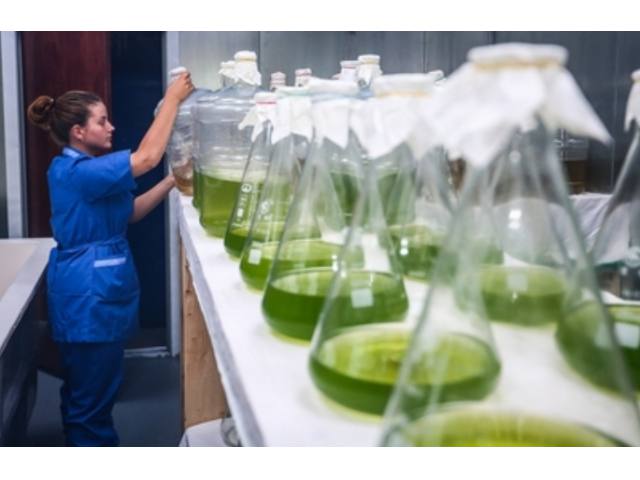Algae may become the next-generation biofuel

According to the declarations of the researchers, algae can cope with the task of processing carbon dioxide into biofuel, though the technology of the process still requires some modifications.
Very often the inhabitants of rivers and lakes suffer from a thick layer of aquatic plants, which cover the water surface. The scientists from the University of Wageningen, Netherlands are currently working on the methods of application of such aquatic plants in the biofuel production. In particular, their key objective is to reduce the prime cost and to reduce the amount of the energy consumption.
Biofuel has been regarded for a long time as a potential substitute for oil products. The use of algae as raw material opens up the opportunity to get a wide range of fuel products including biodiesel. Taking into account the fact that algae reduce the degree of carbon dioxide in the atmosphere, it is reasonable to expect that this type of fuel will be environmentally friendly.
Besides, unlike other raw materials for the biofuel production, the aquatic plants do not need land, which is so necessary for growing foodstuffs. They can be grown in arid areas and even absorb carbon dioxide of the industrial emissions. Another incontestable advantage is a high growth rate in comparison with the traditional agricultural crops and the capacity to produce twentyfold as more of fuel by means of exploiting the same amount of space. This information is provided by Beatrix Schlarb-Ridley, the representative of the Research Centre InCrops Enterprise Hub at Cambridge University.
Unfortunately, the existing technologies for the biofuel production from algae prove that this type of fuel cannot be referred to as environmentally friendly. At present the cultivating of algae is carried out in the different types of bioreactors and there arises an acute problem owing to the fact that some equipment consume more energy than they are capable of producing and create an inadmissible amount of carbon dioxide. "If we grow algae at the current level of the technology development, then for the most part, we will get a negative energy balance with a higher degree of carbon dioxide emissions than when the traditional types of fuel are used", states Rene Wijffels, the representative of the University of Wageningen.
Theoretically, the bacteria can be assembled into a single mass by applying flocculants, which facilitates the removal of water from the centrifuge. It can increase the cost of the production, for flocculants must be eventually removed. Instead, Rene Wijffels determined to secure the algae grouping without any assistance. In order to reach his goal, he added the flocculant strain Ankistrodesmus falcatus into the reactor preliminary filled with the strain Chlorella vulgaris, and consequently he discovered that these two types of algae have formed a clump.
"We can use a combination of two types of micro-organisms, one of which will produce fuel products, the other one will initiate their accumulation. Undoubtedly, we are going to attain a ratio in which the amount of algae that produces fuel will significantly exceed the amount of algae, stimulating their bunching", declared sir Wijffels.
To achieve better results in the financial side of the question and in respect of the energy consumption ratio during the production, sir Wijffels intends to carry on improving the technology at the Algae Production and Research Centre at the University of Wageningen. This Centre enables the study of the various processes of cultivating algae under equal conditions. Such companies as Exxon Mobile, Total and Synthetic Genomics Company, owned by the prominent biologist Craig Venter provide their support for the Centre. The research can be conducted in an open evaporating pond and in six outdoor bioreactors.
Considering the above-mentioned information, we can state that the production of biofuel from algae can be profitable only if during the processing other valuable products are produced. This conclusion has been drawn by Beatrix Schlarb-Ridley who issued her report for the British Biotechnology and Biological Sciences Research Council.
"Even if we manage to reach a high level of biomass formation, it still creates the need for the technologies providing some other products development. Fortunately, algae may become a good raw material for the production of the animal and fish fodder having a high protein content. Besides, bioreactors can be successfully integrated into the farms and into the fish industry, where they are supposed to absorb the wastes saturated with nitrogen", declared she.







